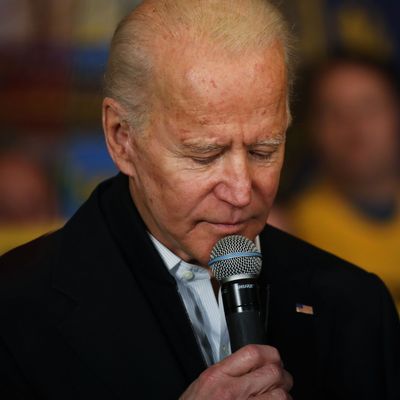
As Joe Biden gives his acceptance speech as the 2020 Democratic presidential nominee, a reward he formally clinched in early June, it’s a good time to remind ourselves how improbable the moment looked earlier this year.
After months and months and months as the presumed front-runner for the nomination, Biden stumbled out of the gate when voters started going to the polls, finishing fourth (behind Sanders, Buttigieg, and Warren) in Iowa and then fifth (behind the the same four plus Amy Klobuchar) in New Hampshire.
Only one presidential nominee since Iowa emerged as a big player has ever lost both these states and gone on to win the nomination: Bill Clinton in 1992. But Iowa wasn’t even contested that year (favorite son Tom Harkin had the caucuses locked up), and Clinton finished a reasonably strong second in New Hampshire. Running fifth in New Hampshire has never been a signpost on the way to victory.
After New Hampshire, Biden lost his long-standing lead in national polls, and was even looking shaky in his firewall state of South Carolina, where Bernie Sanders and free-spending Tom Steyer were creeping up on him. Meanwhile, even before New Hampshire, centrist Democratic insiders were beginning to stampede toward Michael Bloomberg, whose immense spending on ads in Super Tuesday and later states looked like the best insurance against a Bernie Sanders nomination.
Ironically, it would be Bloomberg who would give Biden the opening for a truly astonishing comeback, beginning at a February 19 debate in Las Vegas, when, as I put it at the time, he “walked out on that stage in the Paris Theater and directly into a buzzsaw.” Elizabeth Warren eviscerated Bloomberg for his record of bad behavior toward women who worked for him, and it didn’t get better:
The former mayor stayed on the defensive much of the debate, hit with challenges on his past support for GOP candidates and policies, and his advocacy of “stop and frisk” police tactics, among other controversial positions … And he was, from beginning to end, anti-charismatic, even bored looking, appearing every bit the “arrogant billionaire” Warren labeled him.
Many ex-Biden supporters took a long look at Bloomberg and saw “a punching bag who wouldn’t last more than a round in the ring with Donald Trump.”
In the subsequent Nevada caucuses, Bernie Sanders routed the field, but Joe Biden finished second in the first state on the calendar with significant minority voting. The two “centrist” candidates who beat him in New Hampshire, Pete Buttigieg and Amy Klobuchar, showed once again their bases of support were distressingly lily-white. And in the blink of an eye, the Biden comeback was complete. After a good (for him) debate performance in Charleston, Uncle Joe exceeded expectations in South Carolina and trounced Sanders and Steyer among Black voters. Then, just before Super Tuesday, where he had enormous momentum against both Bloomberg and Sanders, Biden drew simultaneous endorsements from Buttigieg and Klobuchar and regained his fundraising mojo. On March 3 itself, Biden won 10 of 14 states (including Elizabeth Warren’s Massachusetts), and beat Bloomberg everywhere. Within two days, Warren and Bloomberg were out of the race, and Biden had the one-on-one match with Bernie Sanders he wanted.
The rest, as the saying goes, is history. It almost feels like ancient history given the pall the pandemic cast over the remainder of the primaries.
I don’t want to suggest that Biden was some sort of Mr. Magoo lucking into accidental success. His hard-won assets had a lot to do with the comeback, particularly the support among Black voters and leaders who rejected Kamala Harris and Cory Booker on his behalf and stayed with him when things looked grim. Still, it all could have gone some other way — if, for example, Mike Bloomberg had just said his campaign would begin in the Super Tuesday states and skipped that disastrous debate in Nevada.
With all Biden has survived this year, and throughout his half-century political career, the cage fight that he and Kamala Harris face against Team Trump won’t be a walk in the park, but probably won’t intimidate him, either.






























